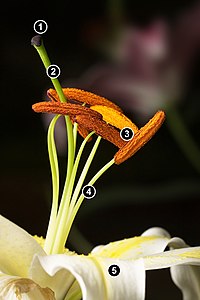Lily
The lily is a genus of flowering plant. There are many species of lilies, like trumpet lilies and tiger lilies. They are usually quite tall, and are perennials.
| Lily | |
|---|---|

| |
| Lilium candidum | |
| Scientific classification | |
| Kingdom: | Plantae |
| Clade: | Tracheophytes |
| Clade: | Angiosperms |
| Clade: | Monocots |
| Order: | Liliales |
| Family: | Liliaceae |
| Subfamily: | Lilioideae |
| Tribe: | Lilieae |
| Genus: | Lilium L.[1] |
| Type species | |
| Lilium candidum | |
| Species | |
| Synonyms[1] | |
| |

Most lilies grow from a bulb, which in some species develops into a rhizome, which carries small bulbs. A highly efficient technique for multiple shoot and propagule formation in lilies through plant tissue culture technique was given by Yadav et al., in 2013[3]
Lilies grow in Europe, North America, and Asia. There are more than 100 species, and many cultivated varieties. They also come in various colours. It tends to grow wild in the forest and a grassy plain of a mountainous area, but several kinds grow wild on wet ground. A lily's petals come in multiples of three. The fleur de lys is a stylized depiction of the lily.

Toxicity
changeSome Lilium species are toxic to cats, especially Lilium longiflorum.[4][5]The mechanism is not exactly known but it involves damage to the kidneys, which can cause acute renal failure. Veterinary help should be sought, as a matter of urgency, for any cat that is suspected of eating any part of a lily – including licking pollen that may have brushed onto its coat.[6]
References
change- ↑ 1.0 1.1 "Lilium". World Checklist of Selected Plant Families. Archived from the original on November 14, 2017. Retrieved June 13, 2014.
- ↑ lectotype designated by N. L. Britton et A. Brown, Ill. Fl. N. U.S. ed. 2. 1: 502 (1913)
- ↑ Yadav, Rakesh; Yadav, Neha; Pal, Minakshi; Goutam, Umesh (2013-12-01). "Multiple shoot proliferation, bulblet induction and evaluation of genetic stability in Asiatic hybrid lily (Lilium sp.)". Indian Journal of Plant Physiology. 18 (4): 354–359. doi:10.1007/s40502-014-0060-4. ISSN 0974-0252. S2CID 256393829.
- ↑ Langston CE (2002). "Acute renal failure caused by lily ingestion in six cats". J. Am. Vet. Med. Assoc. 220 (1): 49–52, 36. doi:10.2460/javma.2002.220.49. PMID 12680447. S2CID 19542358.
- ↑ Hall J (1992). "Nephrotoxicity of Easter Lily (Lilium longiflorum) when ingested by the cat". Proc Annu Meet Am Vet Int Med. 6: 121.
- ↑ "Lily poisoning in cats – Vet Help Direct Blog". 2 May 2010.